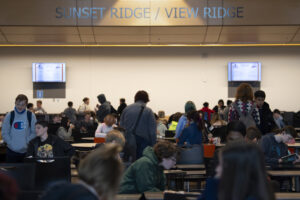Camas public school teachers hit the picket lines this week, calling for better class sizes; equitable funding for music, health and library programs; and a cost-of-living salary increase that keeps pace with local inflation rates.
The 2023-24 school year in Camas, which was supposed to begin Monday, Aug. 28, has been postponed during the teachers’ strike, and schools remained closed as of Thursday, Aug. 31.
Representatives from the Camas School District and the Camas Education Association (CEA), the union representing around 450 Camas educators, continue to bargain for a new, three-year teachers’ contract this week.
Following failed negotiations Monday night, CEA vice president Michael Sanchez said the teachers’ union continues to bargain “in good faith” despite what he called “threats” from the district.
“By saying that they have presented their ‘last, best and final offer,’ Superintendent (John) Anzalone made it clear that the district had walked away from the bargaining table,” Sanchez said Tuesday in a recorded message to the community posted on the CEA website (weteachcamas.org). “As of the evening of Aug. 28, the district asserted that they expect CEA to accept their proposal without any further discussion.”





